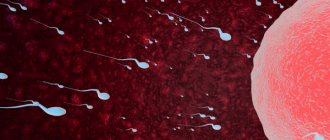If you're worried about miscarriage at 8 weeks, the first symptoms you might notice are cramping pain and bleeding. These are common early signs of miscarriage, but they don't necessarily mean your pregnancy will end. The only way to definitively tell if a miscarriage is occurring is with a blood test for hCG (pregnancy hormone) to check levels, or an ultrasound to listen to the baby's heartbeat.
In the article you can find answers to any questions that arise regarding miscarriage. If you think you are at risk of miscarriage, you should seek medical help!
How does miscarriage occur in early pregnancy?
This problem in medicine is considered quite serious, because it is encountered frequently, and in most cases the process is almost impossible to stop . If a miscarriage or spontaneous termination of pregnancy occurs at the very beginning, then the woman may not even understand what happened.
Without realizing her situation, the woman simply thinks that the menstrual cycle has gone wrong or there has been a delay (usually a week or two). Then some feel minor pain in the abdomen , and menstruation begins, which, however, can be much heavier than usual. Not all women experience such bleeding, but only those who are frightened by the release of a blood clot, similar to a burst bubble.
However, it is worth going to the doctor , even if nothing else bothers you. They will do an examination to see if it was indeed an early miscarriage, and will also check whether additional cleaning is needed after this.
If a woman knows about her pregnancy, then she needs to be very attentive to any manifestations of pain or discomfort in the abdomen and back. The slightest spotting discharge mixed with blood or tissue clots is already dangerous. Sometimes the pregnancy can still be maintained , so you should consult a doctor immediately.
Spontaneous termination of pregnancy occurs before 12 weeks, which is classified as an early miscarriage. If it happens before 22 weeks, it will already be late. Unfortunately, this also happens for a number of reasons. Then doctors define this threat as premature birth, and with prompt and timely intervention they can save the premature baby.
Is it normal to pump milk after infant loss?
Yes, it is very common for a woman to experience lactation after the loss of her baby. Lactation occurs due to hormonal changes that occur inside a woman's body. This condition can begin a couple of days after the tragic event. Where some women may experience severe breast discomfort or pain, others may not feel it. You can either let nature do its thing and wait a few weeks for your milk to dry up, or you can step up and take charge and follow some ways to stop your milk supply. The choice is yours; however, if you decide to call it a day yourself, you can follow some of our recommendations.
Causes of threatened miscarriage in early pregnancy
Why does early miscarriage occur? Sometimes a woman faces this problem several times in a row . Doctors call this recurrent miscarriage.
The cause of spontaneous miscarriage in the early stages is very difficult to determine; this will require a comprehensive detailed examination, many different tests and appropriate treatment.
But it may also happen that even this will not help, that is, the termination of pregnancy will be influenced by factors that simply cannot be predicted or prevented.
The main reasons that cause or provoke miscarriage include a number of socio-biological and medical factors. The first group is purely personal and subjective reasons:
- unfavorable conditions (place of work in hazardous production, radiation, exposure to environmental toxins, difficult psycho-emotional background and microclimate in the family, etc.);
- unhealthy lifestyle and bad habits (if you are planning to conceive, then you should quit smoking, not drink alcohol, give up strict diets, excessive coffee consumption, adjust your diet and daily routine);
- a woman’s age is also often one of the reasons for miscarriage;
- Stressful situations , nervous shocks or strong emotions are a serious threat to a little life. A woman should protect herself from all this, but under no circumstances take sedatives, so as not to harm the baby even more. It is better to consult a doctor to find the right way out if stress cannot be avoided;
- do not ignore the danger that all kinds of physical activity can pose to a child. Avoid heavy physical work and do not lift heavy objects (even bags with groceries that weigh more than 5 kg are taboo for you). You will also have to approach sports with caution. Some types, especially extreme ones, cannot be combined with pregnancy. Be careful with hot baths, baths or saunas;
- If you have had an accident (unforeseen emergency, car accident, etc.) so that you are seriously injured or injured, your body may not be able to cope with maintaining the pregnancy. Even a minor fall due to negligence (uncomfortable shoes, ice, etc.) is dangerous.
Medical reasons or women's health problems
- Doctors say that early miscarriage is most often caused by genetic disorders or abnormalities in the fetus. A woman may suffer from a hereditary form of the pathology, although there are also isolated mutations that lead to the death of the embryo. This is influenced by a whole range of different factors: radiation, viruses, unfavorable environmental conditions, etc. It is no longer possible to control or stop this process. Thus, nature itself produces a kind of control, saving you from non-viable offspring. However, doctors recommend that couples who want to conceive a healthy child seek advice from a geneticist, and also carefully prepare for the upcoming pregnancy.
- Very often, the cause of spontaneous miscarriage in the early stages is hormonal disorders in a woman’s body. If you detect the problem in time and seek help from a doctor, this threat can be eliminated. The most common complaints are a lack of the hormone progesterone, although there are also cases of increased levels of male hormones. Problems with the thyroid gland and adrenal glands, which prevent the organs from functioning correctly and fully, also cause miscarriages. Usually in such cases, hormonal therapy or appropriate treatment is prescribed. It is better to check the condition of your body before pregnancy.
- Any pathology on the part of the immune system threatens termination of pregnancy. The most common manifestation is a complication in the form of Rh conflict. This means that your body is fighting an embryo that is foreign to it and rejecting it, because its blood Rh factor is negative, and the one taken from the father is positive. If this possibility exists, doctors recommend prophylaxis with immunomodulators.
- infection is very dangerous for pregnancy . This includes all sexually transmitted diseases: herpetic and cytomegalovirus infections, toxoplasmosis, chlamydia, syphilis, trichomoniasis and others. Due to the fact that the membranes are affected by viruses and pathogenic bacteria, the fetus itself can be infected, which leads to miscarriage.
- Also a serious risk for the baby are inflammatory diseases of internal organs and even common infectious diseases: viral hepatitis, rubella, influenza or sore throat with complications and fever, pneumonia and others. When planning a pregnancy, pay close attention to your health in order to identify and eliminate any possible dangers.
- Abortion is a huge stress for the female body . If previous pregnancies were interrupted artificially, then there is a huge risk of complications that lead to miscarriage or even secondary infertility. Be sure to tell your doctor if you have had an abortion before.
- The first trimester of pregnancy practically excludes the use of any medications , drugs and even herbs. All this often poses a great threat to the life of the fetus and affects its development. Never self-medicate, because even simple parsley as a seasoning can lead to increased uterine tone. Always consult your gynecologist and read the instructions carefully.
Miscarriage is also caused by the individual characteristics of a woman’s body. So, if she suffers from congenital anomalies of the structure of the uterus, isthmic-cervical insufficiency, oncological diseases of the genital organs or other pathologies, then often the pregnancy simply cannot be maintained.
Yellow formations
Yellow discharge after an abortion indicates the presence of an infection caused by the penetration of pathogenic microorganisms:
- staphylococcus;
- coli;
- protea;
- streptococcus.
The listed microbes are dangerous for the female body, weakened after termination of pregnancy. They can lead to various diseases:
- chlamydia;
- trichomoniasis;
- venereal pathologies.
Yellow discharge in a woman after an abortion may also indicate the onset of an inflammatory process. This often happens due to unskilled work of doctors and non-compliance with prescribed recommendations.
Threatened miscarriage in the early stages: signs and symptoms
How to recognize an early miscarriage and what are the symptoms?
There are several main stages of spontaneous abortion, since it does not happen all at once. Each of these stages is characterized by its own symptoms according to the threat of miscarriage in the early stages, and sometimes this can be stopped or prevented if you seek treatment from a doctor in time.
So, the first signs of a miscarriage in the early stages, which should alert you to any manifestations of pain or pain in the back and abdominal area, which are accompanied by brown or red discharge . Sound the alarm even if a few drops of blood appear from the vagina, because this may already indicate an early miscarriage. Also pay attention to your condition: have the main signs of pregnancy disappeared?
Do not miss scheduled visits to the doctor , mandatory tests or necessary examinations. This way you can rule out any pathologies in the development of your baby and be confident that the pregnancy is going well.
Main stages of miscarriage
- Threat or risk of spontaneous abortion. This condition happens very often, which is why some women are forced to remain in bed for almost the entire 9 months. It is characterized by the above-mentioned cramping pains and bleeding, sometimes even very copious ones. You can also note increased uterine tone.
- The second stage is more serious - it is classified as an incipient miscarriage or spontaneous abortion. The fertilized egg has already partially detached from the walls of the uterus, so the symptoms of spontaneous miscarriage in the early stages will be pronounced. But doctors still consider this stage to be reversible, that is, with prompt and qualified intervention, they can save your child’s life.
- With the so-called “miscarriage in progress,” the pregnancy cannot be saved. At this stage, the woman feels severe and sharp pain, and heavy bleeding occurs almost immediately. The fertilized egg has already died, and the cervix is open, so it can come out all at once or in parts, which will be considered an incomplete miscarriage.
- The last stage is a completed spontaneous abortion . The uterus, having expelled the dead fertilized egg, contracts and returns to its previous size.
Also, on an ultrasound, the doctor can detect a failed abortion or fading pregnancy, when due to some reason the fetus died, but the miscarriage did not occur. This is also a very dangerous condition, because suppuration or blood poisoning is possible if the necessary measures are not taken in time.
Simple tips for caring after baby loss
It can be difficult, but it is vital that you move beyond your physical and emotional loss. Here are some simple care tips you can follow after the loss of a child or after the birth of a child:
- Make sure your body is healing well—and to do that, you need to be well rested. Pay attention to your diet and include plenty of fresh fruits and vegetables.
- Drink plenty of water and meet your body's fluid needs. You can also include fresh fruit juices, coconut water, milk and other liquids.
- You may experience abdominal pain or cramps after a miscarriage or stillbirth. You can use warm compresses to relieve the pain or take painkillers such as paracetamol or ibuprofen to reduce the pain.
- You can massage your lower abdomen to relieve pain in this region. Massage can also help reduce any bleeding-related pain and can also help return the uterus to its normal size.
- You should abstain from any sexual intercourse for two days after the end of vaginal bleeding.
- If you experience severe abdominal pain, vaginal bleeding, or have a high fever, contact your doctor immediately.
Diagnosis of threatened miscarriage
The main diagnostic method is ultrasound examination . At the slightest suspicion of a miscarriage, it is better to immediately consult a doctor.
Both signs and symptoms may vary, but the hospital will be able to comprehensively examine you, using an ultrasound to find out what stage of spontaneous abortion you are at, and what can be done to save the baby (if this is still possible).
Another method that helps you understand whether the baby is alive is to measure the level of hCG in your blood: it will be significantly lower if the pregnancy is terminated.
Pathological condition
After termination of pregnancy, the discharge is odorless, of medium intensity, lasting up to 12 days. Symptoms indicate the development of pathology:
- temperature increase;
- unpleasant odor of dark discharge;
- blood comes out in a large volume;
- brown discharge after an abortion persists for 3 or more weeks;
- after the bleeding stops, yellow or green mucus appears.
Surgical and medical abortion always causes discharge in a woman, but it is important to monitor the formations and condition of the genital organs. Any deviations from the norm can threaten health and life, and also lead to dire consequences for reproductive function.
Treatment for threatened miscarriage in the early stages
If you managed to identify the threat and sought medical help in time (in the early stages), then in the future you should be even more careful and strictly follow all the recommendations of your doctor.
To maintain a pregnancy, a woman may need to:
- observe bed rest and eliminate any physical activity (in special cases it becomes necessary to go to the hospital for preservation);
- get rid of negative experiences, stress, anxiety;
- take hormonal medications or immunomodulators (as prescribed by a doctor);
- undergo antiviral, antifungal, antibacterial therapy;
- surgical intervention (in the case of isthmic-cervical insufficiency, the doctor will place sutures on the cervix, which will be removed only before childbirth. This way, the growing fetus will be able to stay in the cavity. There is also surgical correction for abnormal structures of the uterus, although not in all cases.
What can you do to knock it down?
To bring down a fever, it is necessary to identify the cause of its occurrence. Next, they eliminate it. Doctors advise taking the following medications:
- antibiotics;
- anti-inflammatory drugs;
- wound healing medications;
- antispasmodics;
- hormones;
- antipyretics;
- immunostimulants;
- antihistamines;
- vitamins;
- drugs that stimulate an increase in uterine tone.
If drug treatment does not bring results, they resort to a new operation - curettage, drainage.
Prevention of miscarriage
How to prevent the threat of early miscarriage? To avoid the most common causes of threatened miscarriage in the early stages, you should undergo all the necessary examinations . This way you can exclude possible problems in the form of pathologies, chromosomal disorders, infectious or hormonal diseases, vitamin deficiency, etc.
Of course, a couple who wants to conceive a full-fledged and healthy child must reconsider their lifestyle, giving up bad habits and adjusting their diet.
The nature of menstruation
Menstruation after a mini-abortion and other methods of stopping the development of the fertilized egg changes its character. The first cycle occurs 30-40 days after scraping or drug therapy. The timing may increase depending on the health of the abortion patient.
Restoration of the menstrual cycle occurs after 3-6 months. During this period, a woman may observe little discharge or, conversely, an unusually large amount. There is no need to worry - even a mini-abortion leads to hormonal imbalance. This is why after an abortion a woman changes psychologically.
After an interrupted pregnancy, it is important to remember about contraceptive methods. The ability to bear a child returns very quickly as soon as the discharge ends after vacuum abortion and other methods of getting rid of an unwanted fetus.
You need to find out from your doctor what kind of discharge you should have after a mini or medical abortion. If a woman sees a pathological condition in herself, she should not delay her visit to the hospital. When there is a lot of discharge after an abortion, the temperature and pain become constant, the patient needs hospitalization.
Treatment and consequences after miscarriage in early pregnancy
What to do after a miscarriage in early pregnancy? If it did happen that the pregnancy could not be maintained and you lost the child, then you need to undergo therapy, which is mandatory after a miscarriage. The doctor should send you for an examination of the body to determine the reason that caused the miscarriage (if this has not been done previously).
You definitely need to check whether the fertilized egg has completely left the walls of the uterus, since if the abortion is incomplete or not completed, you will need curettage. Antibiotics will also be to help cope with a possible infection, and hormonal contraceptives. This stabilizes your hormonal levels.
In addition to the physical stress on the body, a miscarriage is a very serious psychological and emotional test for any woman. The pain of loss can develop into severe, protracted depression, especially if the pregnancy was long-awaited and desired. Don’t isolate yourself during this difficult time, try to trust your spouse, parents, and loved ones so that they will support you and help you get through the grief. Allow yourself to be sad and cry, you can even seek help from a psychologist if you are unable to cope with your feelings.
You should not be afraid of the same failures in the future and despair. Just be more responsible in your next pregnancy planning after an early miscarriage. Remember that the body still needs recovery , so do not rush to become a mother again for at least six months. During this time, you can get rid of existing problems, take a course of necessary vitamins, and undergo complex therapy prescribed by the doctor.
The correct psychological attitude and only positive thoughts that everything will be fine with you, and after a certain period of time you will take your long-awaited baby in your arms is also very important.
How to stop breastfeeding after feeding your baby?
Breast milk can make your breasts feel tender and heavy. Sometimes your breasts may also become swollen or swollen. It may take some time to overcome your emotional pain, but some ways can help you reduce your physical pain. Here we will discuss some ideas on how to stop lactation after miscarriage or abortion:
- Sage tea is an effective home remedy that can help combat many medical ailments. You can also consume sage tea to stop milk production.
- It is believed that taking vitamin B6 supplements may help reduce breast milk supply.
- You should refrain from any nipple stimulation. This is because any vigorous touch or stimulation can increase your milk supply.
- Rest to recuperate is one of the most effective ways to heal the body. Make sure you give your body enough rest and allow it to heal naturally.
- Cabbage leaves can also be used to suppress breast milk production. Take some fresh cabbage leaves and wash them well. Put them in the refrigerator for a while. Apply cold cabbage leaves to your breasts to stop milk production and also to reduce pain associated with breast engorgement.
- Hot water baths are very effective in relieving any pain associated with breast engorgement or tenderness. A stream of warm water on your breasts can ease the flow of milk and stop your agony.
Recommendations for pregnant women
If you find out that you are carrying a small life inside you, then you need to minimize as much as possible the potential risks that could lead to miscarriages. Follow simple rules: adjust your diet, give up bad habits, lead a healthy lifestyle, don’t overwork, be extremely careful, avoid stress and nervous shock.
Be sure to register with the antenatal clinic . The doctor will help identify illnesses or problems that you did not even know about, but that may pose a threat to your baby. Timely treatment or prevention will help prevent the threat of miscarriage. Follow all the recommendations your gynecologist gives you.
At the slightest sign of danger, go to the hospital immediately . In most cases, pregnancy can still be maintained. If you have experienced the loss of a child, do not despair and do not be alone with your pain.
What to do if breast discharge appears
If you notice discharge from the mammary gland, there is no need to panic. You just need to contact a mammologist as soon as possible, who will prescribe you a blood test and ductography to make a diagnosis. After diagnosis, the doctor will select the appropriate treatment for you.
Discharge from the mammary glands when pressed
In pregnant women and those who are breastfeeding, it is considered normal for fluid to be released when pressing on the nipple of the mammary gland. If the discharge does not occur during breastfeeding, then you need to consult a specialist, because there is a risk of developing dangerous diseases.
Discharge from the mammary glands during pregnancy
Discharge during pregnancy (colostrum) can occur almost from the first days of pregnancy. Such discharge is considered absolutely as normal as its absence.
Breast discharge and menstruation
If discharge from the mammary glands appears before the menstrual cycle, then you should not panic in advance, because before menstruation, discharge from the breasts, which is physiological in nature, is often observed. But it is still worth consulting a mammologist on this issue.
What happens in the body in the first trimester
In the first trimester, the uterus only softens and becomes more flexible, but does not yet swell. A mucous clot called a plug also forms inside the uterus. The cork protects the embryo from negative influences, bacteria and other dangers. In the later months of pregnancy, once the plug is out of the body, labor can begin at any time.
At this stage, the fetus itself begins to take shape, for example, the slight outline of the head appears. This period is interesting because it is the period that becomes decisive in the development of the embryo. Unfortunately, a miscarriage is possible at this stage, so you should pay close attention to your condition and well-being while carrying a baby.
Formation of the placenta
An equally important point at this stage will be the formation of the placenta - the protective membrane of the fetus, through which it will receive nutrition from the mother throughout pregnancy.
The fourth week of pregnancy is the period when the placenta just appears, representing a sac with many nerve endings. Complete formation of the placenta is achieved only by the sixteenth week after conception. At the end of pregnancy, the placenta comes out with the newborn.
Photo ultrasound
At such a short period of time, the fetus is barely noticeable in ultrasound photographs. Usually an ultrasound examination is prescribed to further confirm pregnancy.
In ultrasound photographs, the “corpus luteum” will be barely noticeable, enveloping the entire embryo. It will be a temporary protector of the fetus during the formation of the placenta around it.











